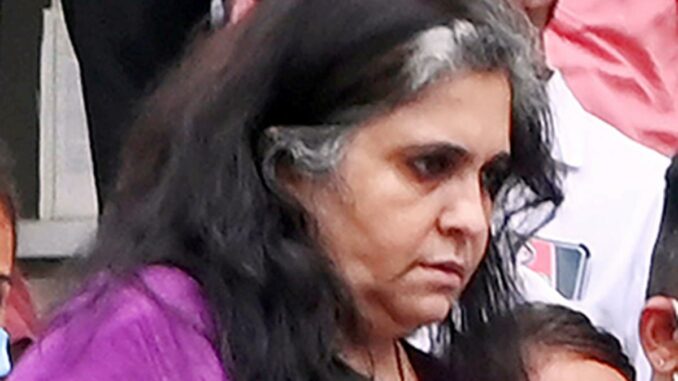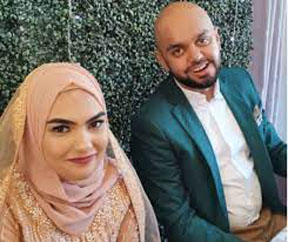
NEW DELHI (TIP): Social activist Teesta Setalvad has been in custody for over two months and, as a woman, is entitled to “favorable treatment” under the Code of Criminal Procedure (CrPC), the Supreme Court prima facie told Gujarat on Thursday, September 1. “Suppose we give her interim bail and let the matter be taken up [by the Gujarat High Court on September 19?” the apex court queried. The court is hearing a plea for bail filed by Ms. Setalvad, who is accused of forgery and fabrication of evidence in connection with the 2002 riots cases.
“There is no offence here against her which comes with a rider, nothing like POTA or UAPA in which bail should not be granted… There is no such thing. These are normal IPC [Indian Penal Code] offences. Under Section 437 of the CrPC a lady is entitled to favorable treatment,” Chief Justice of India U. U. Lalit, heading a three-judge Special Bench, asked Solicitor General Tushar Mehta, appearing for Gujarat.
Held on June 25 by the Gujarat Anti-Terrorist Squad
She was arrested in Mumbai on June 25 by the Gujarat Anti-Terrorist Squad (ATS), a day after the Supreme Court, in a judgment, dismissed allegations of “larger conspiracy” levelled by Zakia Jafri, widow of Congress leader Ehsan Jafri who was killed in the 2002 Gujarat riots, against former Chief Minister Narendra Modi and over 60 senior State officials. In its judgment in the Jafri case, the apex court had snubbed Ms. Setalvad, who had fought the case on behalf of Ms. Jafri for decades. The Supreme Court on Wednesday said it was “actually struck” by the fact that Ms. Setalvad was detained by the Gujarat Police on June 24 and kept in custody for over two months on the basis of a complaint which merely “recites” the adverse remarks made by the court against her.
“What actually struck us is that your complaint does not recite anything more than what the Supreme Court said… The judgment is out on June 24. The complaint is filed on June 25, within just a day… Obviously the author of this complaint was not privy to anything more than what the Supreme Court said…” Chief Justice Lalit observed orally.
Chief Justice Lalit, speaking for the Bench of Justices S. Ravindra Bhat and Sudhanshu Dhulia, challenged the State to produce on record at least one case in which the bail application filed by a woman was listed, after issuing notice to the State, for hearing again after six whole weeks. The Gujarat High Court, which issued notice to the State on Ms. Setalvad’s bail plea on August 3, chose to list the case on September 19. Bail jurisdiction normally requires the court to hear and decide pleas as quickly as possible as the personal liberty of a person is at stake. Chief Justice Lalit asked Mr. Mehta whether this was the “standard practice in the Gujarat High Court”. The court asked the State whether it had collected any additional material during the custodial interrogation of the activist in the past two months. “As things stand today, the FIR is nothing but what has happened in the Supreme Court… in the last two months, have you filed a chargesheet or is the investigation still on,” Chief Justice Lalit asked.
Court’s reminder
The court reminded the State about Section 167 of the Code which provides a 60 to 90-day deadline for completion of investigation after which the accused was entitled to bail.
“These are not offences like Sections 302 or 307 [murder, attempt to murder]… These offences are particularly based on documents… and this happens to be the case of a lady,” the CJI pointed out.
The apex court indicated it cannot accept the State’s argument that it should not touch the case because her appeal against a sessions court’s rejection of bail was pending in the High Court.
The CJI said the apex court could intervene in bail matters depending on the facts and circumstances of each case. “To say the High Court is the final court in bail matters is not inviolable,” Chief Justice Lalit said.
Senior advocate Kapil Sibal and advocate Aparna Bhat, for Ms. Setalavad, submitted that the FIR does not reveal what document she had supposedly forged. There is no prima facie case against her in the FIR. It is the court concerned, and not the State, which had to lodge a complaint of perjury, if any. Besides, it was the prosecution which had filed documents in the court in the riots cases, not Ms. Setalvad.
Witness statements
Mr. Mehta strongly opposed the court’s suggestion to grant the activist interim bail. He said Ms. Setalvad was not arrested out of some “pleasure or fun”. There were witness statements allegedly showing she was part of a “larger conspiracy” hatched against the entire State post the riots.
The law officer said the High Court had not given her any “special treatment”. She had herself chosen to approach the High Court in appeal. The listing of the case was within the administrative powers of the Chief Justice concerned. There were “thousands and thousands” of accused in other cases similarly waiting for their bail cases to be heard. The State practiced equality before the law. The apex court should not entertain her petition and ought to let her take her chances before the High Court.
“If Your Lordships feel that this [September 19] is too long and want to advance the hearing…” Mr. Mehta hinted. He finally sought an adjournment to further argue. The court scheduled the case for September 2.





Be the first to comment